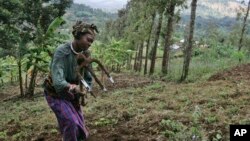Several transnational corporations have come to Tanzania to invest in plantations in the country's Southern Agricultural Growth Corridor, a region the size of Italy.
The initiative is sponsored by a food security alliance created by the G7 group of industrialized countries. The goal is to bring innovation to agriculture and create more jobs in the sector to reduce poverty and wipe out hunger in the nation.
There is, however, an intensifying debate over how to reform farming in Tanzania and other countries. Who can produce the food the world needs — plantations or small-scale farmers?
“Today, Tanzania is 53 million people and they don’t really have the ability to keep up with the change. I think it's a race against the clock,” said Per Carstedt, executive chairman of Agro EcoEnergy, a Swedish company that is one of several corporations working on the corridor project. His sense of urgency comes largely from the fact that more than half of all Tanzanians are under age 17.
He said the nation needs to transform its agriculture to create new jobs and support economic growth before a demographic crisis hits.
Africa’s time bomb
It's not just Tanzania that needs an agricultural revolution.
“If you are not able to provide jobs and opportunities for [developing countries] in the future, it’s a ticking bomb," Carstedt said. He thinks the world needs to increase food production 60 percent in the next 45 years.
Carstedt is urging Tanzania and its neighbors to take a hint from Brazil, a country that turned to large-scale farming and became the world’s largest exporter of sugar.
He noted that Brazil now accounts for 50 percent of the world's sugar exports.
"Why is it not possible to replicate the same kind of development here?” he asked.
Poor, small-scale farmers in Tanzania, however, are siding with those who oppose large corporate investment in agriculture.
Resistance in the corridor
There’s a simmering standoff in Razaba, a village in Tanzania’s Bagamoyo district, over the Swedish company’s plan to establish a sugar plantation. There have been lengthy disputes over property compensation. As a result, the project is four years behind schedule.
Agro EcoEnergy said it had consulted the villagers in Bagamoyo, but a recent study by ActionAid Tanzania said the majority of small-scale farmers in Razaba had not been offered a choice on whether to be resettled or stay on their land.
The report said they also had been denied crucial information about the irreversible effects of the project on their livelihoods and food security.
Local farmers expressed fear about the loss of prime land and authorities' failure to engage them in the process.
Nawahi P. Nawahi, 59, a father of four, said the confusion about the land acquisition had disrupted local farmers' lives.
“A lot of the food crops and produce have dried up. There’s nothing here now; we have even stopped planting to wait for the evaluation process,” said Nawahi, who used to grow maize, beans, paw paws, cassava and vegetables on his 2.4-hectare parcel of land.
Another small-scale farmer, Alala Shaibu, 26, decried what he saw as the breakdown of traditional social structures because of the simmering tensions.
“I am aware of families that have been torn apart while a big number of children have dropped out of school because their parents are unable to cater for their basic education,” she said.
Tanzanian officials said the Bagamoyo project “is a special case” and that the land belonged to the government. Dr. Moses Kusiluka, the commissioner for lands, said the site was initially earmarked as a ranch for livestock keeping before it was abandoned.
Swiss alternative
Amid the uncertainties facing the Bagamoyo sugarcane plantation project, a group of smallholder farmers in Morogoro, about 170 kilometers west of Dar es Salaam, offers hope. The farmers kept their land and adopted eco-friendly farming practices that promise higher yields and income.
Pius Paulini, secretary of a farmers group in Morogoro, said a local nongovernmental organization called Sustainable Agriculture Tanzania (SAT) enabled farmers to perform their own agricultural revolution.
“We formed this farmers group in 2010 with the aim of addressing low crop yields occasioned by declining soil fertility, inadequate rainfall and high cost of farm inputs,” Paulini said. With funding from the Biovision Foundation of Switzerland, SAT staff trained Morogoro farmers to use sustainable techniques instead of expensive synthetic fertilizers.
Benedict Mongula, an associate professor of economics at the University of Dar es Salaam’s Institute of Development Studies, said a farmer using these methods has better results in terms of income, food and nutrition while working on his small piece of land than when toiling on large-scale plantations.
“To me, the farmer in his own two-hectare plot is able to make more than a casual laborer,” Mongula said. “Up until such a time when the government is able to regulate the minimum wage to equate the living wage, the laborer will still be at the disadvantage.”
Mongula recently published a study on the impact of plantations on small-scale farmers in Tanzania's south highlands. He said African governments should look for investments like expanding irrigation to transform rural agriculture.
Biovision’s Stefanie Keller said there’s plenty of scientific research arguing that small-scale farmers could feed the world. The U.N. Food and Agricultural Organization said small-scale farmers already produce 70 percent of the food consumed globally.




